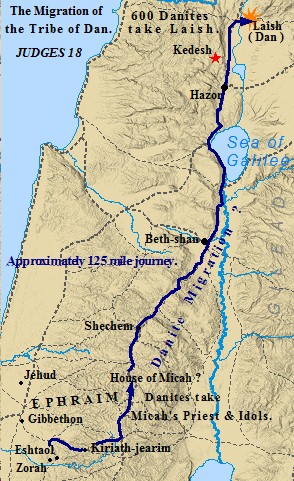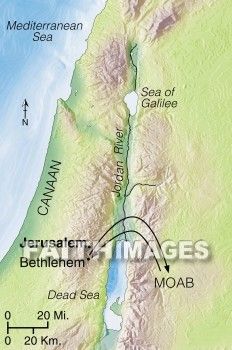On Sunday, March 25, 2012, Yujin wrote,
In Joshua 21:45, we read, "Not a single one of all the good promises theLord had given to the family of Israel was left unfulfilled; everything he had spoken came true."
In Genesis 15 God promised Abraham that he would have descendants as innumerable as the stars in the heavens. And it came to pass. They started with a clan of seventy and grew to over two million in just four generations. They were also promised possession of the land of Canaan. And it came to pass. Joshua 21:45 is the statement of its fulfillment. All these promises were made in a covenant, where God bound only Himself to keep it by walking alone between the divided animal carcass.
Now, while Abraham's descedants became great, there were also times when they became few, and many were killed in the wilderness so that they became half as many as they could have been after the forty years. And although God gave them the land of Canaan, they did not finally conquer all of it. So, how can it be said that none of God's good promises were "left unfulfilled"?
God promised to give x to them but He did not promise that any given generation would take it or keep it. If there was a shortcoming to the promises of God to Abraham, it was this. Although God had given them such great promises, they were not given the faith to fully grasp them and keep them because of their disobedience. Even the covenant later made with King David (2 Samuel 7) came short in this regard, so that while God's promise of a perpetual kingship was true, the Davidic kings failed to grasp and keep the promise because of their disobedience. One may even say that it was the failure of human "free will."
This is why the New Covenant became absolutely necessary. The New Covenant would fulfill that part which generations of Israel failed to do, namely "trust and obey God." Listen to the words of the New Covenant in Jeremiah 31:31-34,
31 “The days are coming,” declares the LORD,
“when I will make a new covenant
with the house of Israel
and with the house of Judah.
32 It will not be like the covenant
I made with their ancestors
when I took them by the hand
to lead them out of Egypt,
because they broke my covenant,
though I was a husband to them,”
declares the LORD.
33 “This is the covenant I will make with the house of Israel
after that time,” declares the LORD.
“I will put my law in their minds
and write it on their hearts.
I will be their God,
and they will be my people.
34 No longer will they teach their neighbors,
or say to one another, ‘Know the LORD,’
because they will all know me,
from the least of them to the greatest,”
declares the LORD.
“For I will forgive their wickedness
and will remember their sins no more.”
The essence of the New Covenant, is not, as many have taught, the death and resurrection of Jesus Christ. That death and resurrection ratified the covenant and made it effective; however, the covenant itself had to do with God Himself putting His law on people's hearts and minds and making them know Him and making them His people. The New Covenant is all about overcoming the failure of human "free will" by the imposition of God's sovereign will. The uniqueness of the covenant is not in the atonement, for the hope of atonement existed from the beginning; however, it was in the enjoyment of that atonement, which God would accomplish through His gift of faith. And the New Covenant would only be finally fulfilled in us when we are with the Lord, because while we remain in the flesh, we are still connected with our sinful natures.
Therefore, when we celebrate the New Covenant, we are celebrating God's gift of faith, whereby, the knowledge of God is not taught but supernaturally given by God to the elect, namely, those that God has saved in Jesus Christ. Therefore, while we celebrate what Jesus has accomplished for us, we also rejoice in what God has accomplished in us.
On Friday, March 25, 2011 (Last Updated on 3/23/2016), Unmi wrote,
5 tribes have already received their inheritance (Reuben, Gad, Manasseh, Ephraim, Judah), now the rest of the land is distributed by lot to the remaining 7 tribes. The Tribe of Dan receives the last allotment. Of note, in the Second Census, Danites numbered 64,000 (Numbers 26:42-43), they were the second largest tribe after Judah.
The seventh lot came out for the tribe of Dan according to its clans. 41 The territory of their inheritance included: Zorah, Eshtaol, Ir Shemesh, Shaalabbin, Aijalon, Ithlah, Elon, Timnah, Ekron, Eltekeh, Gibbethon, Baalath, Jehud, Bene Berak, Gath Rimmon, Me Jarkon and Rakkon, with the area facing Joppa. (Joshua 19:40-46)
Dan receives a small area of land in central Israel, between Judah and Ephraim, bordering with the Philistines. "The Amorites confined the Danites to the hill country, not allowing them to come down into the plain." (Judges 1:34) and "the territory of the Danites was lost to them" (Joshua 19:47)
Judges 18 described the events that lead to Danites moving/settling in the extreme Northern city of Laish (also known as Leshem) "In those days the tribe of the Danites was seeking a place of their own where they might settle, because they had not yet come into an inheritance among the tribes of Israel." (Judges 18:1) So they sent skies to explore the land, they arrive in Laish and find the people there are living in peace and prosperity. They go back to Dan and advise the Danites to attack the inhabitants and take over the city. 600 Danite men armed for battle attack and take over the city. There the Danites set up for themselves the idol, and Jonathan son of Gershom, the son of Moses, and his sons were priests for the tribe of Dan until the time of the captivity of the land. They continued to use the idol Micah had made, all the time the house of God was in Shiloh. (Judges 18:30-31) At that time, the Tabernacle was in Shiloh (prior to the Temple being built later in Jerusalem). This comment seems to imply that the Danites did not go to the Tabernacle in Shiloh to worship in the LORD, instead they set up and worshipped man made idols, even had their own priest to lead the worship.
When the kingdom divided, Jeroboam, the king of the Northern Kingdom didn't want his people to go to Jerusalem to worship, so the king made two golden calves. He said to the people, “It is too much for you to go up to Jerusalem. Here are your gods, Israel, who brought you up out of Egypt.” One he set up in Bethel, and the other in Dan. And this thing became a sin; the people came to worship the one at Bethel and went as far as Dan to worship the other.(1 Kings 12:28-30) The city of Dan (Laish) is not only the center of worship for the Danites as they worshipped Micah's idols early on, now they become a center of worship for the other Northern tribes as well.
This abandonment of their allotted inheritance to live in Laish seems to fulfill what Moses said about them. When Moses blessed all the tribes prior to them entering the Promised Land, Moses says of Dan: “Dan is a lion’s cub, springing out of Bashan.” (Deuteronomy 33:22) Bashan is the area of land North of the Jabbok River and East of the Sea of Galilee, the territory of Bashan was given to the Eastern Half tribe of Manasseh. (Joshua 22:7) The new city of Dan is located on the northern border of Bashan.
From a military standpoint, this choice of land wasn't a wise move for the Danites. The enemies of Israel, the Assyrians and the Babylonians, both came and attacked Israel from the North. The city of Dan would have been one of the first cities to be destroyed by these invading armies.


On Friday, March 26, 2010 (Last Updated on 3/24/2021), Fernando wrote,
I found it interesting that Bethlehem was not a Judean town, but rather a Zebulun town. Yet later is known by Judaen men.
Yujin commented... Great observation, Fernando! There are actually two cities called Bethelehem in the Bible. One is in the North in the territory of Zebulun near Nazareth and referenced only once in the Bible, namely, Joshua 19:15. Every other reference is to Bethlehem in Judah, where Jesus was born. This latter Bethlehem was also known in the OT as Ephrath or Ephrathah (cf. Genesis 35:19; 48:7; Ruth 1:2; 4:11; Micah 5:2).